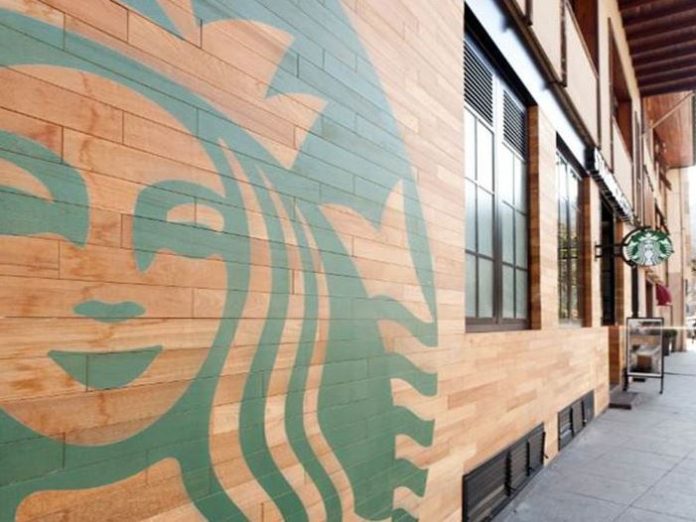Thinking and drinking
About that coffee brand
Howard Behar was headed to give a talk at Texas Christian University on April 4 and decided, like many people, to stop at Starbucks for a cup of Joe to give him a little java jolt.
The line of cars in the drive-thru was punishingly long, so he stopped, ran in and grabbed a cup before half the cars had made it through the line. How could he help but laugh, since Behar was essentially the man that finagled drive-thrus at the Seattle-based coffee chain in the first place?
Behar, retired founding president of Starbucks International, shared that story during his discussion at the Tandy Executive Speaker Series at TCU’s Neeley School of Business.
Behar, a retailer at heart, is one of the cofounders, along with another Howard – Schultz – of Starbucks, now ranked No. 64 among brands. Coming from essentially nowhere – i.e., Washington state – in the early ’90s, the chain has become ubiquitous. Walk into a meeting with a Starbucks latte and guess what? You’re helping the brand sell itself.
Schultz didn’t like drive-thrus. Part of Starbucks’ growth philosophy in the beginning was based on customers sitting inside, sipping coffee and having conversations. Some of that was driven by a book, The Great Good Place, by Ray Oldenburg. The book says people seek out places where they can gather outside of work and home and enjoy the company of others. This communal philosophy drove Starbucks – and still does to some extent – but it didn’t make sense if you were huddled in a car waiting in line. Not much communion there except trying to get your order right. But Behar was determined. He found an out-of-the-way Starbucks that wasn’t doing much business.
“And so we snuck one in and it was a blowout,” he said. “They just blew the cover off of it in sales.”
Schultz still didn’t like drive-thrus, but he didn’t think much of Frappuccino either, said Behar. “He likes [drive-thrus] now and I think every other store has a drive-thru.”
Behar said he knew Starbucks was onto something early on. The company had a store in Vancouver, British Columbia, that was doing well but it was in a building that some thought was in danger of demolition. Behar asked someone to secure a space nearby in case that happened. Behar forgot about it, thinking they might get a lease in a year or two. Instead, they came back with a lease, just across the street. Starbucks went ahead and opened the second store within walking distance of the first.
“The day we opened that store we doubled the volume on that corner,” he said. “We had a store generate a million dollars. And we had another store that generated almost a million dollars.
And the stores were serving two different kinds of customers.
“On one corner it was business people, and the other corner was for bikers. And they were as different as night and day. It was amazing! That’s when I knew we had something,” he said.
Listening to people – customers and employees – has been the secret to Starbucks’ success, Behar explained to the students and other attendees at the breakfast. It also explains the title of his book, It’s Not About the Coffee.
“If you’re working in a bank, your product has to be good. You have to be able to compete. If you’re working in a coffee shop, your coffee has to be good,” he said.
“What makes the organization great are the people in the organization. And they have to be people who are committed to the higher purpose of the organization. And not only growing the organization, but growing themselves first as human beings, and then employees,” he said. “And I think the number one responsibility of any employer is to grow their people. You grow the people; the people grow your organization, and a growing organization grows your business.
“And that equation is pretty simple, isn’t it? And I’ve watched it work, time after time. “
Behar is not afraid to call out others in business for their attitude toward workers and customers.
“I’m just blown away by Uber,” he said, referring to the transportation network company that has faced criticism for its dealings with the public, its employees and government officials. “That’s why businesses get a bad reputation, because [they] don’t care about the people!”
When Behar hears a company executive say, “Our people are our biggest asset,” it sets off alarm bells.
“As soon as I hear that, I know there’s a leader who doesn’t get it, because people are not assets. Trucks are assets. Computers are assets. Buildings are assets. People are human beings.”
Not that Starbucks hasn’t faced some criticism, particularly when its holiday Christmas cups didn’t predominantly feature traditional Christian themes one year.
“Our buddy Donald Trump even got in on the deal, right? Accuses us of being, whatever he accuses us of being,” he said. “Our Christmas cup was just solid red. It had nothing on it. I don’t know what’s more Christmas than red.”
“I may be Jewish but-I don’t hate Christians,” he said.
Next time you’re waiting in line at Starbucks, think about Mr. Behar. He helped build a great brand, with some help from those assets – I mean people – behind the counter.






